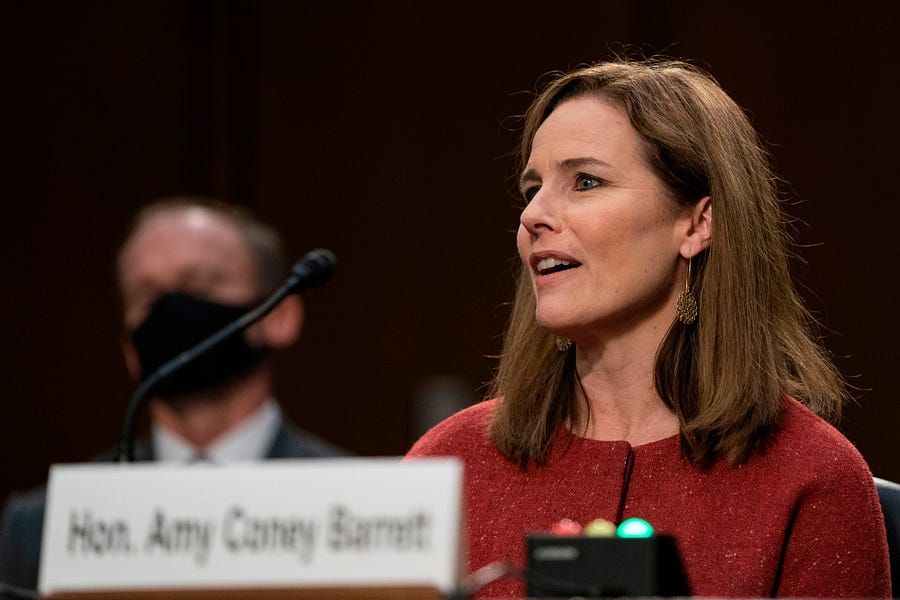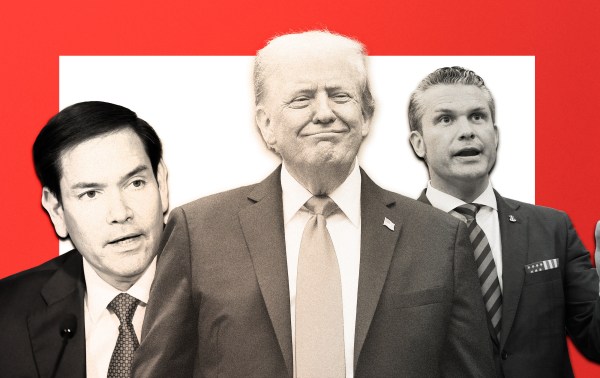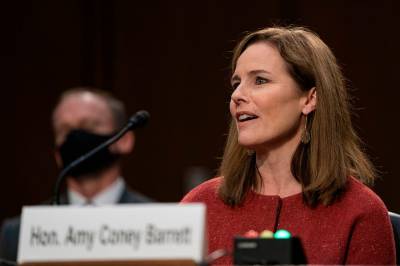Watching the Amy Coney Barrett confirmation hearings, you might think you fell into a hole in the space/time continuum and emerged sometime in January 2012. For one thing, in their decorum and sheer political and judicial caution they look like something from the Time Before—before Trump, before Kavanaugh.
It’s as if Team Biden got on a Zoom call with the Democratic members of the Senate Judiciary Committee and said, “If anyone gives the GOP even one new viral video attacking Judge Barrett for her faith or her family, when we come into our power, we shall smite thee with a mighty hammer.”
We haven’t had—and shouldn’t expect—a “dogma lives loudly within you” moment like we saw in 2017 when Dianne Feinstein questioned Barrett in her nomination hearing for the 7th Circuit Court of Appeals. Instead, the hearings have focused a great deal on something else entirely, Obamacare.
That’s the second reason for flashing back to 2012. We’re suddenly talking about Obamacare almost as much now as we did then. In March of that year, SCOTUS held oral arguments in NFIB v. Sebelius, better known as the “Obamacare case.” Imagine if a judicial vacancy came up in the weeks before argument. Imagine the intensity of the questioning of the nominee and the concern for his or her ruling.
That’s what’s happening here—a judicial vacancy has occurred just before yet another Obamacare argument. The state of Texas’s challenge to Obamacare will be heard just days after Justice Barrett is likely to take her place on the court.
But there’s a difference between 2012 and 2020. Yes, there’s an Obamacare oral argument—and yes once again conservatives are seeking to strike down the entire law—but this time the vast majority of informed legal observers recognize the lawsuit is an exercise in legal futility. There’s virtually no chance SCOTUS will end Obamacare.
(In fact, I’m so confident that Obamacare will survive that I told my colleague and Advisory Opinions co-host, Sarah Isgur, that if I’m wrong I promise to compose an original, three-minute ode to my least-favorite athlete of all time, Christian Laettner, and sing it live on the podcast as penance.)
Why is the Obamacare case hopeless? One word: severability, which I’ll expand on below. But if it’s hopeless, why is it getting so much air time at Barrett’s nomination hearing? I’ve got one name—Trump.
Let’s deal with the legal issue first, which is inseparable from the long—often incoherent—conservative fight against Obamacare. Though the passage of Obamacare ignited the Republican grassroots and helped fuel the GOP takeover of the House in 2010 (and, to some extent, its takeover of the Senate in 2014), there was never any real hope of repealing or substantially reforming Obamacare through the legislative process while Barack Obama was still president.
So the conservative movement focused on the courts, launching its first and principal challenge to the law soon after it passed in NFIB v. Sebelius. The plaintiffs argued that Congress lacked the power to compel states to expand Medicaid and that it lacked the power to compel individuals to purchase health insurance. Moreover, they argued that the individual mandate was critical to the viability of the entire statute—without the mandate, the entire law could no longer function and must be struck down.
In other words, the plaintiffs argued that the mandate wasn’t “severable” from Obamacare. Instead, it represented the beating heart of the entire statutory scheme. In fact, the Obamacare statute itself declares, “The requirement [to buy health insurance] is essential to creating effective health insurance markets in which improved health insurance products that are guaranteed issue and do not exclude coverage of pre-existing conditions can be sold.” Nor does the statute contain a “severability clause,” a legal provision that states if one provision of the law fails legal review, the rest of the law still stands.
We all remember what happened next. SCOTUS struck down the mandatory Medicaid expansion, but Justice Roberts famously upheld the individual mandate as a proper exercise of Congress’s taxing power. He joined with the four Democratic nominees to uphold the core of the law.
Fast forward to the Trump administration. The GOP’s first effort to repeal the law failed when John McCain gave his now famous “thumbs-down” gesture on the Senate floor on July 28, 2017. You can watch that moment again here:
But the GOP-led Congress wasn’t quite finished with the ACA. In December 2017, as part of the Tax Cuts and Jobs Act, it reduced the tax penalty for failure to obtain health insurance to zero. It did not, however, change any other portion of the law.
The state of Texas (joined by multiple states) filed suit, claiming that since there was now no “tax” imposed for failure to obtain insurance, there was no longer a taxing power justification for the individual mandate. And without the mandate, Obamacare itself has to fall. After all, doesn’t the statute itself call the mandate “essential”?
The logic sounds compelling, does it not? Indeed, the trial court found it compelling and ruled that all of Obamacare should fall. The court of appeals essentially punted on the question, and the Supreme Court took up review. Oral arguments are set for November 10, and it could well be one of the first cases Justice Barrett will hear.
But the logic isn’t compelling. Not at all. And the reason is rooted both in severability doctrine itself and, crucially, in congressional action. First, there is a strong bias in favor of severing unlawful provisions from the rest of the statute, rather than burning the entire statute to the ground. In fact, just last term the Supreme Court decided an important severability case, called Barr v. American Association of Political Consultants. Justice Kavanaugh wrote the opinion, and here are the key paragraphs:
From Marbury v. Madison to the present, apart from some isolated detours mostly in the late 1800s and early 1900s, the Court's remedial preference after finding a provision of a federal law unconstitutional has been to salvage rather than destroy the rest of the law passed by Congress and signed by the President. The Court's precedents reflect a decisive preference for surgical severance rather than wholesale destruction, even in the absence of a severability clause.
More:
Applying the presumption, the Court invalidates and severs unconstitutional provisions from the remainder of the law rather than razing whole statutes or Acts of Congress. Put in common parlance, the tail (one unconstitutional provision) does not wag the dog (the rest of the codified statute or the Act as passed by Congress). Constitutional litigation is not a game of gotcha against Congress, where litigants can ride a discrete constitutional flaw in a statute to take down the whole, otherwise constitutional statute. If the rule were otherwise, the entire Judiciary Act of 1789 would be invalid as a consequence of Marbury v. Madison.
Also, consider this vitally important fact. Congress itself zeroed out the individual mandate without touching the rest of the law. The plaintiffs aren’t challenging Obamacare 1.0, which contained the mandate. They’re challenging Obamacare 2.0, an act of Congress that gutted the mandate but kept everything else. In such circumstances, it would be almost unheard-of for the court to torch the entire statute.
Does this mean that it’s bad faith for the Democrats to keep acting like the law is in peril? Are they hyping a threat that’s not a threat? Why aren’t Republicans attacking them more strongly for fearmongering?
That brings us to Donald Trump. In June, his administration filed a brief arguing that “the individual mandate is not severable from the rest of the act.” His solicitor general argues:
If this Court concludes that, notwithstanding the legislative background invoked by the intervenor States and House, Congress’s statutory findings tie the invalid mandate to the guaranteed-issue and community-rating provisions, then it necessarily follows that the rest of the ACA must also fall—which is a text- and structure-based conclusion that the invoked legislative background cannot undermine.
That’s the legalese. Here’s the administration’s brief in video form:
For those who didn’t click, the video above is a compilation of “own goals.” In the midst of a pandemic, the administration filed an almost certainly fruitless legal argument that seeks to strip even the most popular provisions of Obamacare (including statutory protections for people with pre-existing medical conditions) from the body politic—and it did so without even the prospects of pushing a viable replacement plan through Congress.
So not only did the president of the United States lend his weight to a hopeless case, he boxed in Senate Republicans who may want to distance themselves from his efforts. And he also gave Senate Democrats the excuse to relentlessly hammer the issue home during Barrett’s hearing and during the closing days of the presidential campaign.
But you know one person who should be positively happy that the hearing has focused so much on Obamacare? Judge Barrett. One of her first key rulings in her new SCOTUS career will almost certainly repudiate the legal position of the man who appointed her. It will help establish her independence and demonstrate what many of us already know—that she’s a woman of high integrity who possesses a legal mind that is entirely her own.
One last thing …
Ten finals. Four titles. Finals MVP in his 17th season. How do you spell GOAT?
LeBron.
Heed the words of Kendrick Perkins:
Photograph by Alex Edelman/AFP/Getty Images.







Please note that we at The Dispatch hold ourselves, our work, and our commenters to a higher standard than other places on the internet. We welcome comments that foster genuine debate or discussion—including comments critical of us or our work—but responses that include ad hominem attacks on fellow Dispatch members or are intended to stoke fear and anger may be moderated.
With your membership, you only have the ability to comment on The Morning Dispatch articles. Consider upgrading to join the conversation everywhere.